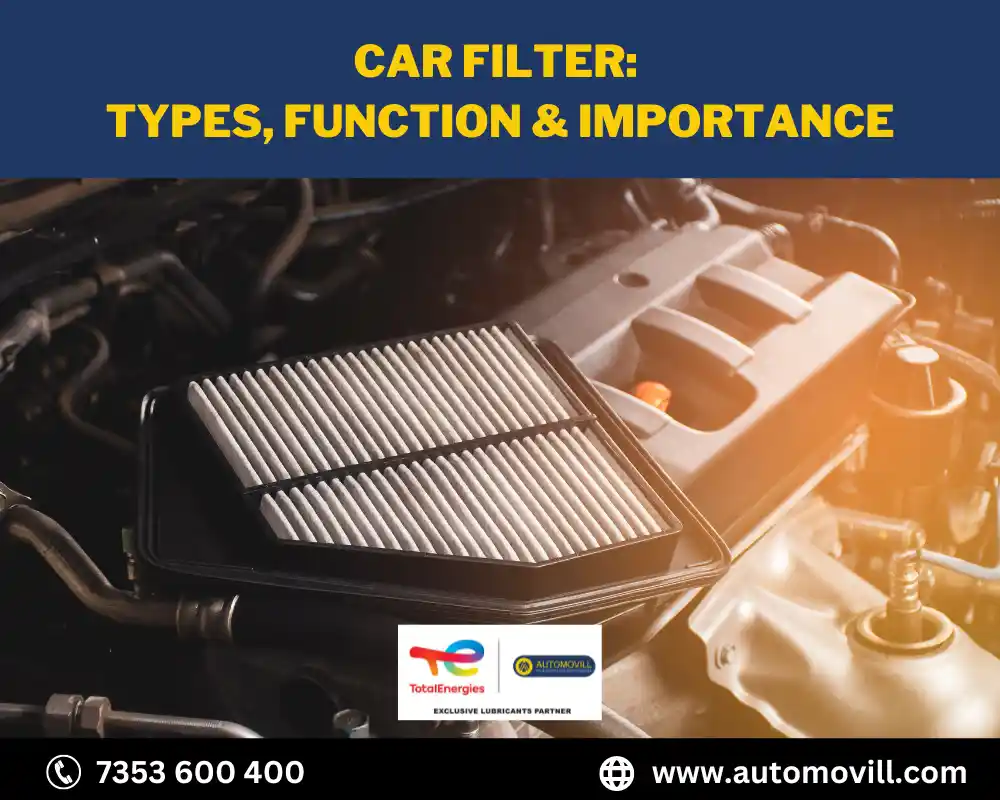
If you have a car then regular car maintenance is important, and filters play a crucial role in ensuring the longevity and optimal performance of your car. Filters help to keep harmful contaminants and debris from entering vital components, ensuring clean air, fuel, and oil flow throughout the engine.
In this blog, we will discuss the different types of filters in cars, their functions, and the importance of filters in maintenance
Types of Filters
There are several types of filters in a car, each serving a specific purpose. Here are the most common ones:
1) Air Filters
Air filters are among the most important filters in your car.
- Function: Air filters prevent dust, dirt, and other particulate matter from entering the engine’s combustion chambers.
- Importance: A clean air filter ensures proper airflow, improves fuel efficiency, protects engine components from damage, and helps maintain optimal performance. Over time, air filters can become clogged with dirt and debris, affecting engine performance and fuel economy. Regular replacement of the air filter is necessary to maintain the air quality entering the engine.
2) Oil Filters
Oil filters are essential for the health of your engine.
- Function: Oil filters remove impurities, such as dirt, metal particles, and sludge, from the engine oil, ensuring it remains clean and lubricates the engine effectively. Also read Oil Filter Leak Symptoms & Causes for better understanding.
- Importance: Clean oil is vital for reducing engine wear, preventing damage, and maintaining engine performance and longevity. Over time, oil filters become saturated with contaminants, reducing their effectiveness. Regularly replacing the oil filter during oil changes is crucial to keep the engine running smoothly.
3) Fuel Filters
Fuel filters play a critical role in maintaining the fuel system’s integrity.
- Function: Fuel filters purify the fuel before it reaches the engine, removing contaminants, such as dirt, rust, and debris.
- Importance: Clean fuel filters help maintain fuel system efficiency, prevent clogging of injectors, and protect the engine from damage caused by impurities. A clogged fuel filter can restrict fuel flow, leading to engine performance issues, decreased fuel economy, and potentially costly repairs. Regular replacement of the fuel filter is necessary to ensure the fuel system’s proper functioning.
3) Cabin Air Filters
Cabin air filters contribute to a comfortable and healthy driving environment.
- Function: Cabin air filters clean the air entering the vehicle’s interior, trapping dust, pollen, pollutants, and other airborne particles.
- Importance: Cabin air filters improve air quality inside the vehicle, prevent allergens from entering the cabin, and enhance the performance of the HVAC system. Over time, cabin air filters become dirty and clogged, reducing their effectiveness. Regularly replacing the cabin air filter ensures that you and your passengers breathe clean air while driving.
4) Transmission Filters
Transmission filters are critical for the durability of the transmission system.
- Function: Transmission filters keep the transmission fluid clean by capturing particles and debris that can cause damage to the transmission system.
- Importance: Regularly replacing transmission filters helps maintain smooth gear shifting, prolongs the life of the transmission, and prevents costly repairs. Over time, transmission filters can become clogged, leading to poor transmission performance, slipping gears, and potential transmission failure. Regular maintenance and replacement of the transmission filter are necessary to ensure the longevity and reliability of the transmission system.
Importance of Regular Filter Maintenance
Regular maintenance and replacement of filters are essential for several reasons:
1) Performance and Efficiency
Clean filters ensure proper airflow, fuel delivery, and oil circulation, optimizing engine performance and fuel efficiency. Clogged filters restrict flow, leading to reduced power, decreased fuel economy, and potential engine damage. By regularly inspecting and replacing filters, you can ensure that your engine operates at its best.
2) Engine Protection
Filters protect critical engine components from harmful contaminants that can cause premature wear and damage. Neglecting filter maintenance can result in engine problems, reduced lifespan, and costly repairs. Regularly replacing filters ensures that your engine is shielded from damaging particles, helping to prolong its life and avoid unnecessary repair expenses.
3) Health and Comfort
Cabin air filters contribute to clean and fresh air inside the vehicle, reducing allergens, odors, and pollutants. Regularly replacing cabin air filters enhances the occupants’ comfort and promotes a healthier driving environment. Breathing clean air while driving is crucial for the well-being of you and your passengers.
4) Transmission System Durability
Transmission filters prevent debris from entering the transmission system, ensuring smooth gear shifting and extending the lifespan of the transmission. Neglecting transmission filter maintenance can lead to transmission failure and expensive repairs. By regularly replacing the transmission filter, you can safeguard the transmission system’s durability and performance.
Conclusion
Filters play a vital role in car maintenance by safeguarding the engine, optimizing performance, and enhancing the overall driving experience. Regular inspection and timely replacement of air filters, oil filters, fuel filters, cabin air filters, and transmission filters are crucial to ensure the longevity and efficient operation of your vehicle.
By prioritizing filter maintenance, you can protect your car’s engine, improve fuel efficiency, enjoy a comfortable and healthy driving environment, and prolong the durability of the transmission system. Regular maintenance is the key to keeping your car running smoothly and avoiding potential problems down the road.
